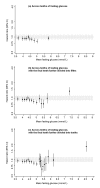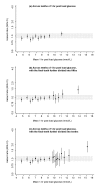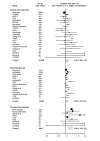Markers of dysglycaemia and risk of coronary heart disease in people without diabetes: Reykjavik prospective study and systematic review
- PMID: 20520805
- PMCID: PMC2876150
- DOI: 10.1371/journal.pmed.1000278
Markers of dysglycaemia and risk of coronary heart disease in people without diabetes: Reykjavik prospective study and systematic review
Abstract
Background: Associations between circulating markers of dysglycaemia and coronary heart disease (CHD) risk in people without diabetes have not been reliably characterised. We report new data from a prospective study and a systematic review to help quantify these associations.
Methods and findings: Fasting and post-load glucose levels were measured in 18,569 participants in the population-based Reykjavik study, yielding 4,664 incident CHD outcomes during 23.5 y of mean follow-up. In people with no known history of diabetes at the baseline survey, the hazard ratio (HR) for CHD, adjusted for several conventional risk factors, was 2.37 (95% CI 1.79-3.14) in individuals with fasting glucose > or = 7.0 mmol/l compared to those < 7 mmol/l. At fasting glucose values below 7 mmol/l, adjusted HRs were 0.95 (0.89-1.01) per 1 mmol/l higher fasting glucose and 1.03 (1.01-1.05) per 1 mmol/l higher post-load glucose. HRs for CHD risk were generally modest and nonsignificant across tenths of glucose values below 7 mmol/l. We did a meta-analysis of 26 additional relevant prospective studies identified in a systematic review of Western cohort studies that recorded fasting glucose, post-load glucose, or glycated haemoglobin (HbA(1c)) levels. In this combined analysis, in which participants with a self-reported history of diabetes and/or fasting blood glucose > or = 7 mmol/l at baseline were excluded, relative risks for CHD, adjusted for several conventional risk factors, were: 1.06 (1.00-1.12) per 1 mmol/l higher fasting glucose (23 cohorts, 10,808 cases, 255,171 participants); 1.05 (1.03-1.07) per 1 mmol/l higher post-load glucose (15 cohorts, 12,652 cases, 102,382 participants); and 1.20 (1.10-1.31) per 1% higher HbA(1c) (9 cohorts, 1639 cases, 49,099 participants).
Conclusions: In the Reykjavik Study and a meta-analysis of other Western prospective studies, fasting and post-load glucose levels were modestly associated with CHD risk in people without diabetes. The meta-analysis suggested a somewhat stronger association between HbA(1c) levels and CHD risk.
Conflict of interest statement
JD has received research funding from the British Heart Foundation, BUPA Foundation, Denka, diaDexus, European Union, Evelyn Trust, GlaxoSmithKline MRC, Merck, National Heart, Lung, and Blood Institute, National Institute of Neurological Disorders and Stroke, Novartis, Pfizer, Roche, Wellcome Trust and UK Biobank. John Danesh is on the Editorial Board of </emph type="italic">PLoS Medicine</emph>.
Figures




References
-
- Goldstein DE, Little RR, Lorenz RA, Malone JI, Nathan DM, et al. Tests of glycemia in diabetes. Diabetes Care. 2003;26(Suppl 1):S106–8. - PubMed
-
- Beckman JA, Creager MA, Libby P. Diabetes and atherosclerosis: epidemiology, pathophysiology, and management. JAMA. 2002;287:2570–81. - PubMed
-
- Coutinho M, Gerstein HC, Wang Y, Yusuf S. The relationship between glucose and incident cardiovascular events. A metaregression analysis of published data from 20 studies of 95,783 individuals followed for 12.4 years. Diabetes Care. 1999;22:233–40. - PubMed
-
- Levitan EB, Song Y, Ford ES, Liu S. Is nondiabetic hyperglycemia a risk factor for cardiovascular disease? A meta-analysis of prospective studies. Arch Intern Med. 2004;164:2147–55. - PubMed
-
- DECODE Study Group, the European Diabetes Epidemiology Group. Glucose tolerance and cardiovascular mortality: comparison of fasting and 2-hour diagnostic criteria. Arch Intern Med. 2001;161:397–405. - PubMed
Publication types
MeSH terms
Substances
Grants and funding
LinkOut - more resources
Full Text Sources
Medical
Miscellaneous

